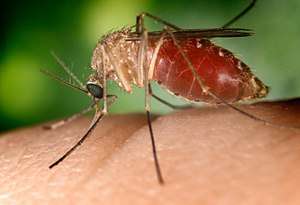Skeeter syndrome
Skeeter syndrome (papular urticaria) is a localized allergic reaction to mosquito bites,[1] consisting of inflammation and sometimes fever. It is caused by allergenic polypeptides in mosquito saliva, and therefore is not contagious.[2]
| Skeeter syndrome | |
|---|---|
 | |
| Culex mosquito on a human finger |
Although the term seems informal, it has appeared in the published literature.[3]
Diagnosis
Clinical examination alone cannot distinguish between a response caused by infection, such as cellulitis, and skeeter syndrome. However, skeeter syndrome usually progresses over the course of hours versus cellulitis, which typically evolves over the course of several days. As such, accurate history is imperative when making the diagnosis. Since IgE and IgG are key players in mosquito allergy, diagnosis can be confirmed by an immunosorbent assay measuring IgE and IgG to mosquito saliva antigens.
Differential diagnosis
The Skeeter syndrome should not be confused with another type of reactivity to mosquito bites, severe mosquito bite allergy (SMBA). SMBA is most often an Epstein-Barr virus-associated lymphoproliferative disease that complicates ~33% of individuals with chronic active Epstein-Barr virus infection or, in extremely rare cases, individuals with Epstein-Barr virus-positive Hodgkin disease or an Epstein-Barr virus-negative lymphoid disease such as chronic lymphocytic leukemia and mantle cell lymphoma.[4] It is a hypersensitivity reaction characterized by the rapid development of skin redness, swelling, ulcers, necrosis and scarring following mosquito bites. The reaction is often accompanied by relatively severe systemic symptoms such as fever and malaise;[5] enlarged lymph nodes, liver, and/or spleen; liver dysfunction; hematuria; and proteinuria.[4]
Treatment
Taking oral cetirizine regularly has been known to help those who suffer from skeeter syndrome.
References
- "'Skeeter Syndrome' Describes Local Allergic Reactions to Mosquito Bites". AllergyWatch. The American College of Allergy, Asthma & Immunology. 2 (1). 2000. Retrieved 2012-05-18.
- Isawa, Haruhiko; Yuda, Masao; Orito, Yuki; Chinzei, Yasuo (2002). "A mosquito salivary protein inhibits activation of the plasma contact system by binding to factor XII and high molecular weight kininogen". Journal of Biological Chemistry. 277 (31): 27651–8. doi:10.1074/jbc.M203505200. PMID 12011093.
- Simons, F.Estelle R.; Peng, Zhikang (1999). "Skeeter syndrome". Journal of Allergy and Clinical Immunology. 104 (3): 705–7. doi:10.1016/S0091-6749(99)70348-9. PMID 10482852.
- Kyriakidis I, Vasileiou E, Karastrati S, Tragiannidis A, Gompakis N, Hatzistilianou M (December 2016). "Primary EBV infection and hypersensitivity to mosquito bites: a case report". Virologica Sinica. 31 (6): 517–520. doi:10.1007/s12250-016-3868-4. PMID 27900557.
- Rezk SA, Zhao X, Weiss LM (September 2018). "Epstein-Barr virus (EBV)-associated lymphoid proliferations, a 2018 update". Human Pathology. 79: 18–41. doi:10.1016/j.humpath.2018.05.020. PMID 29885408.